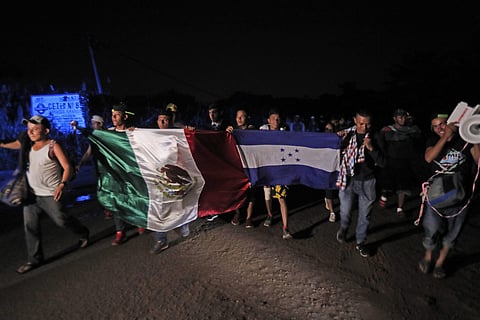

HUIXTLA: Thousands of Central American migrants renewed their hoped-for march to the United States on Wednesday, setting out before dawn with plans to travel another 75 kilometres of the more than 1,000 miles that still lie before them.
The five days of walking in the southernmost reaches of Mexico after seven days in Honduras and Guatemala were beginning to show: Mexican authorities said on Wednesday that about 500 migrants had accepted an offer to be bused back to their countries. Many said they were sick or exhausted, especially the children who toddled or were carried along on the march.
Still, the size of the caravan estimated by the United Nations at more than 7,000 strong seemed basically undiminished as the throng set out in darkness cut by occasional flashlights or the spotlights of municipal police who were escorting them.
Rosa Duvon of Cofradia Cortes in Honduras was pushing two baby boys, both named Daniel a son and a nephew in a rickety donated baby carriage over a potholes road at 5 a.m.
"This thing is going to die," she said of the carriage, pointing to a wobbly back wheel. Still, she vowed to keep going.
In worse condition was Maria del Carmen Mejia of Copan, Honduras, who was already sweating profusely before dawn. She carried in her arms 3-year-old Britany Sofia Alvarado, while with her other hand she clutches the hand of Miralia Alejandra Alvarado, 7, who was also sweaty — and fevered.
Miralia "isn't well, has a fever. Let's see if they give us a ride up ahead. I'm worn out now." But she too pledged to go on. "I've walked a long way. I don't want to return. I want a better future for my children."
While the group has been discouraged by Mexico's government and prompted threats of aid cutoffs for their homelands from U.S. President Donald Trump they have received an outpouring of help from locals as they pass by.
Neighbours have supplied the marchers many of them largely penniless with food and passersby have stopped to give them rides in cars, pickups, even dump trucks.
Such caravans have taken place regularly, if on a smaller scale, over the years, but U.S. President Donald Trump has seized on the phenomenon this year and made it a rallying call for his Republican base ahead of Nov. 6 midterm elections.
Trump has blamed Democrats for what he said were weak immigration laws and claimed with no evidence — that MS-13 gang members and unknown "Middle Easterners" were hiding among the migrants.
Trump later acknowledged there was "no proof" of the claim Middle Easterners were in the crowd. But he tweeted Wednesday that the U.S. "will never accept people coming into our Country illegally!"
The caravan had advanced about 75 kilometers since crossing the border from Guatemala and the marchers hoped to trek another 75 Km on Wednesday to the town of Mapastepec.
Even if they eventually reach the distant U.S. border, many have low odds of qualifying for asylum: The United States does not consider things like fleeing from poverty or gang violence as a qualifying factor.
Nearly 1,700 from the current caravan have already dropped out and applied for asylum in Mexico and hundreds more have decided to return home. The numbers could thin further as people decide to take their chances in Mexico or strike out on their own.